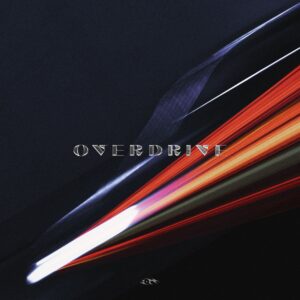
The Monsta X boys do like their car metaphors, don’t they? Their 2021 album No Limit encompassed the “Autobahn” and “Rush Hour” along with the suggestion to “Ride With U”, using the power and speed of these machines to express their points. Although he has departed ways with Starship Entertainment, it seems the group’s maknae I.M remains fond of this imagery. In Overdrive, his second EP–the first with his new company Sony Music Korea–he continues to drive these symbols home. Perhaps it is because he hasn’t left the group, and is instead exploring his own music alongside it, that he is comfortable to continue to explore one of the central motifs of his band’s previous releases.
Overdrive definitely picks up a lot of ideas and concepts that have already been started. These come not only through his band’s work, but more significantly from his first EP, Duality. The soundscape is incredibly similar, with the beat firmly set to “slow”, the synths moody, and I.M’s voice filtered through a vocoder. However, with comparable themes running through both EPs, Overdrive ultimately ends up feeling one-note. Rather than opening up anything particularly new, it’s an addition to the same thesis as Duality.
To be fair to I.M, the car imagery in this album is exclusively in the title track. “Overdrive” uses machine paraphernalia the most in its chorus.
Heat my engine harder ’til I die
Speedin’ on my lane, go overdrive, yeah
In combination with the ideas of something he’s “gotta chase” and “driv[ing] me insane and do this again”, this imagery becomes a symbol of speed, pushing oneself to extremes, and even losing control. This is a consistent theme across the lyrics of almost every song on the track.
In “Blame”, this extreme is expressed through “smoking all the pain to feel you deeply again”. When we get to “More”, this becomes a fully fledged loss of control:
‘Cause I can’t stop this, yeah, addicted
너를 발음하는 혀는 [the tongue that pronounces your name] wavy
Think I drank too much of this liquid

By the end of the album, the title of the final song, “Not Sorry” signals an end point of being beyond these emotions, or at least revelling in the chaos they cause rather than being consumed by them. By the song’s final pre-chorus, he’s calmly repeating “burn it”, a nihilistic instruction that suggests nothing but destruction. It’s well set up by the album’s opening, which has symbolism specifically representing going too fast and driving too hard. I.M shows, across the album’s lyrics, the effects of careering off at such intense speeds; to put it another way, the result of feeling and experiencing intense emotions. It ends figuratively in flames, and mentally in numbness.
Given the sexual undertones of having a strong “drive” (and, let’s be honest, the Freudian interpretations of boys being overly attached to their fast cars), it’s no surprise that this album is at turns equally as lustful as it is pessimistic. Much like its predecessor, Overdrive enjoys the sensual—it fits well with I.M’s low vocal tone and sultry stage presence.
“Blame” is the crossroads of these two symbolic ideas, with I.M’s questioning despair having sexual undertones.
Every moment when I breathe
I feel you deep inside of me
These become the most explicit on “More”, the album’s least introspective track. Here, I.M is in a woozy, yearning mode as he sings about the lust of being with his lover.
Taking off my clothes at the first
And thе thirst just comes in a rush
I won’t make you hush but tell mе if it hurts
I’m lost in our lust

Given that the final song is a defiant rejection of consequences, the implication is that any of these deep emotions and experiences that I.M is contemplating ultimately lead to the same result. Or at least that they can, if they are pushed too far and too hard.
This exploration of the idea of “overdriving” yourself and your relationships is a smart one, but it doesn’t feel like it’s adding anything new to the sultry nihilism of I.M’s first album. There, we saw many of the same ideas playing out: “God Damn”, for example, could fit in between “Blame” and “More” without standing out as different in any thematic way.
The production of all of these tracks also feel overly familiar. There’s nothing wrong with finding a style and sticking to it, as I.M has demonstrably done with his solo work. He clearly favours a slow rhythm, a low base, atmospheric but calm synths, and a slight vocoder-style auto-tuning to his voice. And it’s easy to see why: it suits his presence like a glove. It also fits the weary, sensual yet pessimistic mood of the lyrics—a slow rhythm to draw out the sexual elements, deep tones to convey depth of feeling, to name a few examples.
The problem that emerges on Overdrive is that this style seems to be the only one that I.M wants to work with at all. Of course, there is no obligation to replicate the more bombastic sounds of Monsta X (in fact, it makes sense that he’s stepping away from that), but to contrast that by staying so lo-fi ends up failing musically. There is little to distinguish each song from its predecessor. The lightly jazzy instruments backing “Habit” and “Not Sorry” are mild deviations from the form, but at essentially the same tempo and with the same vocals from I.M, this isn’t enough. “Dumb” attempts some catchy repetition of the title and a slight speeding up of the beat, but again, it doesn’t stand out.

The most inventive moment of the album is in “Overdrive” itself, when the automated beats that have been underlying the song become, in the mid-section, more booming, almost echoing the iconic beat of “We Will Rock You”. This is paired by the rhythm of the song unravelling at its close like a broken cassette tape. These are two little flashes that show flare—why isn’t it shown so much more across the album? If you’re playing with a topic like extremes of emotion and experience, is this not the perfect time to send your sound off in a new direction?
It feels here like I.M has ultimately missed a trick in staying so close to the signature sound that he built up in Duality. Given that on both albums, he wrote and helped to compose every track, this can perhaps be put down to his own personal tastes finally getting free reign, or maybe even to a lack of confidence, to take a more pessimistic approach. It is worth noting, however, that on this EP–unlike his first–I.M is not credited with any of the arrangements. This was done largely by Wooki and Long Drive. Could it be, ironically, that taking his hands off the wheel here led to something so much more pedestrian than it could have been?
I.M has proven on this album that he knows exactly what he wants to express, and what musical style and sound suits him best to achieve his vision. His lyrics, whilst also not tonally a world away from what he has done before, are evocative and complex, detailing an inner life as well as a big canvas of emotions. The problem comes in the lack of diversity in the music itself.

Why this has happened is unclear, and ultimately makes the tracks of the album blend too much into each other and their predecessors. Given that he has new management and two EPs under his belt now, if I.M can bring the lyrical complexity into the music itself, his next work could prove to be a whole new step, rather than a simple continuation of past sounds.


